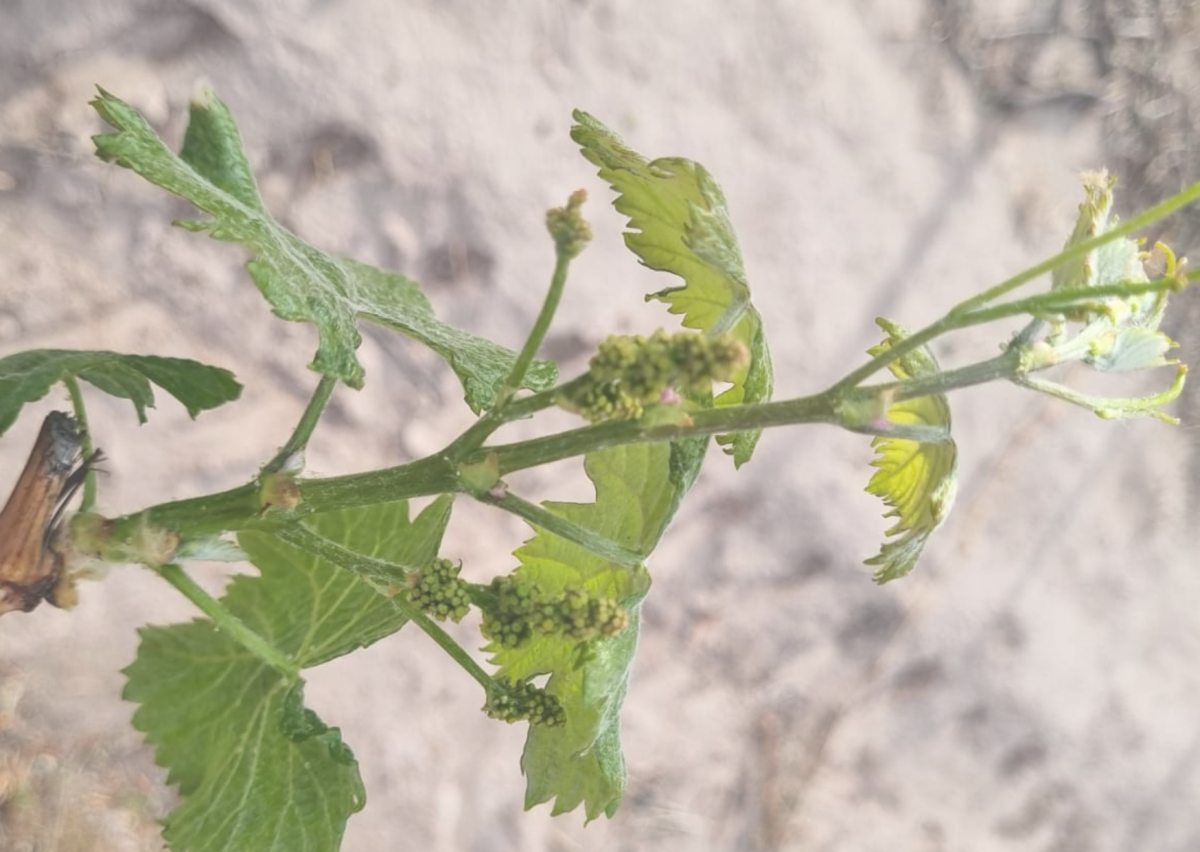Fisiología de la Vid
OBJETIVOS Al finalizar el curso los alumnos deberán: - Conocer los principios de la fisiología de la vid. - Entender la influencia de distintos factores sobre los procesos fisiológicos de la vid. - Comprender la relación planta-ambiente y sus aplicaciones agronómicas.

DOCENTES
Dr. Markus KELLER (Washington State University - USA)
Dr. Jorge PEREZ PEÑA (INTA-EEA Mendoza)
COORDINADOR
Dr. Jorge PEREZ PEÑA
perezpena.jorge@inta.gob.ar
CONTENIDOS
Fotosíntesis y respiración. Transporte xilema y floema. Efectos del microclima en fotosíntesis, transporte por floema y relaciones fuente-destino. Ciclos de crecimiento, vegetativo y reproductivo. Componentes de la uva. Respuestas del crecimiento vegetativo y reproductivo al estrés. Clase práctica para discusión y demostración en viñedo, análisis y discusión de trabajos científicos. Evaluación final.
CRONOGRAMA
|
Tema |
Fecha |
Horario |
Docente |
|
Fenología de la vid, ciclos de crecimiento, formación del rendimiento, composición de fruta |
Lunes 19/05 |
15:00 a 19:00 |
Markus Keller |
|
Fotosíntesis, respiración, trasnpore por floema, interacciones fuente destino, Interacciones Canopia - ambiente |
Martes 20/05 |
15:00 a 19:00 |
Markus Keller |
|
Visita a viñedo |
Miércoles 21/05 |
9:00 a 12:00 |
Jorge Pérez Peña |
|
Relaciones hídricas, funcionamiento estomático, flujo de agua, riego deficitario y composición de fruta |
Miércoles 21/05 |
15:00 a 19:00 |
Markus Keller |
|
Visita a viñedo |
Jueves 22/05 |
9:00 a 12:00 |
Jorge Pérez Peña |
|
Absorción de nitrógeno, asimilación de nitrógeno, discusión de casos. |
Jueves 22/05 |
15:00 a 19:00 |
Markus Keller |
|
Absorción de nutrientes, uso y eficiencia Examen escrito al libro cerrado |
Viernes 23/05 |
15:00 a 19:00 |
Markus Keller |
|
Estudios locales de Fisiología |
Sábado 24/05 |
9:00 a 13:00 |
Dicentes varios |
|
Examen a libro cerrado |
A definir |
|
|
DESARROLLO DEL CURSO
El curso consistirá en clases teóricas y visitas a viñedos.
EVALUACIÓN
Examen final escrito (individual a libro cerrado).
MATERIAL NECESARIO PARA EL CURSO
Se contará con las presentaciones de las clases y el libro del Dr. Keller "The Science of Grapevine: Anatomy and Physiology".
LAS CLASES SON EN INGLÉS SIN TRADUCCIÓN SIMULTÁNEA.
Otra información complementaria:
TEMAS DE LAS CLASES
Fenología de la vid, ciclos de crecimiento
Formación del rendimiento y composición de la fruta
Determinación de la calidad de fruta, comparación de sólidos solubles, estrategias de muestreo
Fotosíntesis, respiración, transporte por floema, relaciones fuente-destino
Interacciones canopia ambiente
Luz y mediciones de intercambio gaseoso
Relaciones hídricas, actividad estomática, flujo de agua
Riego deficitario y composición de fruta
Mediciones de potencial agua, trazado del agua del xilema
Asimilación de nutrientes, asimilación de nitrógeno
Análisis y discusión de artículos científicos
Datos sobre el Dr. Markus Keller
Profesor, Viticulture y Enología en Prosser en el Estado de Washington desde 2001. PhD del Instituto Federal de Tecnología de Suiza en Zurich.
Cuál es mi actividad:
Mi función principal como investigador científico en el campo de la uva es generar conocimiento y desarrollar aplicaciones para beneficio de los viticultores y de la sociedad en general. Mi programa de investigación se centra en los factores ambientales y de desarrollo, así como en las prácticas de manejo, ya que influyen en la fisiología, la productividad y la calidad de los cultivos de uvas para vino y jugo. Mi programa aborda cuestiones relacionadas con el suministro de agua, incluyendo el riego, así como la nutrición y la mecanización del viñedo durante los meses de verano y las lesiones por frío durante los meses de invierno. También imparto docencia a nivel de pregrado y posgrado, así como en programas de certificación on line.
Más información: https://iarec.wsu.edu/people/faculty-and-researchers/
Publicaciones de los últimos años:
Frost S.C., D.J. Fox, M. Keller, T.S. Collins and J.F. Harbertson. 2023. Freeze-killed leaf material causes atypical aromas and astringency in Cabernet Sauvignon. Am. J. Enol. Vitic. 74: 0740005.
Groenveld T., C. Obiero, Y. Yu, M. Flury and M. Keller. 2023. Predawn leaf water potential of grapevines is not necessarily a good proxy for soil moisture. BMC Plant Biol. 23: 369.
Hewitt S., E. Hernández-Montes, A. Dhingra and M. Keller. 2023. Impact of heat stress, water stress, and their combined effects on the metabolism and transcriptome of grape berries. Sci. Rep. 13: 9907.
Kang C., G. Diverres, M. Karkee, Q. Zhang and M. Keller. 2023. Decision-support system for precision regulated deficit irrigation management for wine grapes. Comput. Electron. Agric. 208: 107777.
Kang C., G. Diverres, A. Paudel, M. Karkee, Q. Zhang and M. Keller. 2023. Estimating soil and grapevine water status using ground-based hyperspectral imaging under diffused lighting conditions: addressing the effect of lighting variability in vineyards. Comp. Electron. Agric. 212: 108175.
Keller M., L.J. Mills and A.K. Kawakami. 2023. Optimizing irrigation for mechanized Concord juice grape production. Am. J. Enol. Vitic. 74: 0740008.
Londo J.P., M.M. Moyer, M. Mireles, L. Mills, M. Keller, B.A. Workmaster, A. Atucha and A.P. Kovaleski. 2023. Evaluation of sample preparation practices common with differential thermal analysis of grapevine bud cold hardiness. Am. J. Enol. Vitic. 74: 0740002.
Müller K.K., M. Keller, M. Stoll and M. Friedel. 2023: Wind speed, sun exposure and water status alter sunburn susceptibility of grape berries. Front. Plant Sci. 14: 1145274.
Saxena A., P. Pesantez-Cabrera, R. Ballapragada, K.H. Lam, M. Keller and A. Fern. 2023. Grape cold hardiness prediction via multi-task learning. Proc. AAAI Conference on Artificial Intelligence 37: 15717-15723.
Hewitt, S., E. Hernández-montes and M. Keller. 2023. Heat stress , not water stress , dominates in eliciting metabolic and transcriptomic responses of grape berries 1–25.
Kang, C., G. Diverres, M. Karkee, Q. Zhang and M. Keller. 2023. Decision-support system for precision regulated deficit irrigation management for wine grapes. Comput. Electron. Agric. 208:107777.
Chandel A.K, M.M. Moyer, M. Keller, L.R. Khot and G.A. Hoheisel. 2022. Soil and climate geographic information system data-derived risk mapping for grape phylloxera in Washington state. Front. Plant Sci. 13: 827393.
Keller M., R. Scheele-Baldinger, J.C. Ferguson, J.M. Tarara and L.J. Mills. 2022. Inflorescence temperature influences fruit set, phenology, and sink strength of Cabernet Sauvignon grape berries. Front. Plant Sci. 13: 864892.
Lehr P., E. Hernández-Montes, J. Ludwig-Müller, M. Keller and C. Zörb. 2022. Abscisic acid and proline are not equivalent markers for heat, drought, and combined stress in grapevines. Aust. J. Grape Wine Res. 28: 119-130.
Thapa S., C. Kang, G. Diverres, M. Karkee, Q. Zhang and M. Keller. 2022. Assessment of water stress in vineyards using on-the-go hyperspectral imaging and machine learning algorithms. J. ASABE 65: 949-962.
Zhang, Y., B.M. Chang, B. Burdet, Z. Dai, S. Delrot and M. Keller. 2022. Apoplastic sugar may be lost from grape berries and retrieved in pedicels. Plant Physiol. 190:592–604.
Chang, B.M. and M. Keller. 2021. Cuticle and skin cell walls have common and unique roles in grape berry splitting. Hortic. Res. 8.
Galat Giorgi E, Keller M, Sadras V, Roig FA, Perez Peña J. 2020. High temperature during the budswell phase of grapevines increases shoot water transport capacity. Agric For Meteorol 295:108173.
Hernández-Montes E, Zhang Y, Chang B-M, Shcherbatyuk N, Keller M. 2020. Soft, Sweet, and Colorful: Stratified Sampling Reveals Sequence of Events at the Onset of Grape Ripening. Am J Enol Vitic 2:ajev.2020.20050.
Galat Giorgi E, Sadras VO, Keller M, Perez Peña J. 2019. Interactive effects of high temperature and water deficit on Malbec grapevines. Aust J Grape Wine Res 25:345–356.
Gonzalez Antivilo F, Paz RC, Echeverria M, Keller M, Tognetti J, Borgo R, Roig Juñent F. 2018. Thermal history parameters drive changes in physiology and cold hardiness of young grapevine plants during winter. Agric For Meteorol 262:227–236.
Badr G, Hoogenboom G, Abouali M, Moyer M, Keller M. 2018. Analysis of several bioclimatic indices for viticultural zoning in the Pacific Northwest. Clim Res 76:203–223
González Antivilo F, Paz RC, Keller M, Borgo R, Tognetti J, Juñent FR. 2017. Macro- and microclimate conditions may alter grapevine deacclimation: variation in thermal amplitude in two contrasting wine regions from North and South America. Int J Biometeorol 61:2033–2045.
Romero P, Botía P, Keller M. 2017. Hydraulics and gas exchange recover more rapidly from severe drought stress in small pot-grown grapevines than in field-grown plants. J Plant Physiol 216:58–73.
Keller M, Romero P, Gohil H, Smithyman RP, Riley WR, Casassa LF, Harbertson JF. 2016. Deficit irrigation alters grapevine growth, physiology, and fruit microclimate. Am J Enol Vitic 67:426–435.
Bowen, P., Shellie, K. C., Mills, L., Willwerth, J., Bogdanoff, C., Keller, M. 2016. Abscisic acid form, concentration, and application timing influence phenology and bud cold hardiness in Merlot grapevines. Canadian Journal of Plant Science 96: 347-359.
Casassa, L. F., Keller, M., Harbertson, J. F. Regulated deficit irrigation alters anthocyanins, tannins and sensory properties of Cabernet Sauvignon grapes and wines. 2015. Molecules 20: 7820-7844.
Feng Yi, Wratten, S., Sandhu, H., Keller, M. 2015. Host plants affect the foraging success of two parasitoids that attack light brown apple moth *Epiphyas postvittana* (Walker) (Lepidoptera: Tortricidae). PLoS one 10 (4, e0124773) 20 pp.
Feng, Y., Wratten, S., Sandhu, H., Keller, M. 2015. Interspecific competition between two generalist parasitoids that attack the leafroller *Epiphyas postvittana* (Lepidoptera: Tortricidae). Bulletin of Entomological Research 105: 426-433.
Keller, M. The Science of Grapevine. Anatomy and Physiology (Second Edition) 509 pp. 2015 ISSN/ISBN: 978-0-12-419987-3 Publisher: Elsevier / Academic Press, Amsterdam and others
Keller, M., Deyermond, L. S., Bondada, B. R. 2015. Plant hydraulic conductance adapts to shoot number but limits shoot vigour in grapevines Functional Plant Biology 42: 366-375.
Keller, M., Zhang, Y., Shrestha, P. M., Biondi, M., Bondada, B. R. 2015. Sugar demand of ripening grape berries leads to recycling of surplus phloem water via the xylem. Plant Cell and Environment 38: 1048-1059.
Yazdani, M., Feng Yi, Glatz, R., Keller, M. A. 2015. Host stage preference of *Dolichogenidea tasmanica* (Cameron, 1912) (Hymenoptera: Braconidae), a parasitoid of *Epiphyas postvittana* (Walker, 1863) (Lepidoptera: Tortricidae). 2015. Austral Entomology 54: 325-331.
Zapata, D., Salazar, M., Chaves, B., Keller, M., Hoogenboom, G. 2015. Estimation of the base temperature and growth phase duration in terms of thermal time for four grapevine cultivars. International Journal of Biometeorology 59: 1771-1781.
Zhang Yun, Keller, M. 2015. Grape berry transpiration is determined by vapor pressure deficit, cuticular conductance, and berry size. American Journal of Enology and Viticulture 66: 454-462.
Ferguson, J. C., Moyer, M. M., Mills, L. J., Hoogenboom, G., Keller, M. 2014. Modeling dormant bud cold hardiness and budbreak in twenty-three *Vitis* genotypes reveals variation by region of origin. American Journal of Enology and Viticulture 65: 59-71.
Keller, M., Mills, L. J., Olmstead, M., A. 2014. Fruit ripening has little influence on grapevine cold acclimation. American Journal of Enology and Viticulture 65: 417-423.
Keller, M., Shrestha, P. M. 2014. Solute accumulation differs in the vacuoles and apoplast of ripening grape berries. Planta 239: 633-642.
Cursado
Presencial, a desarrollarse en la Facultad de Ciencias Agrarias - UNCUYO. Horario: 15:00 a 19:00 hDestinatarios
Alumnos de las maestrías/especializaciones acreditadas en la F.C.A. de la U.N. CUYO y profesionales interesados en capacitarse en fisiología de la vid.Inscripción
Los interesados podrán inscribirse mediante el siguiente formulario Google (hacer clic aquí). Una vez aceptada la solicitud de inscripción, el interesado deberá abonar el arancel antes del comienzo del curso, mediante las siguientes formas posibles:
Personalmente en la Cooperadora de la F.C.A.-U.N.Cuyo
Depósito bancario o Transferencia bancaria a la cuenta (en este caso llevar personalmente o enviar por correo electrónico comprobante de depósito/transferencia)
Razón Social: Asociación Cooperadora de la Facultad de Ciencias Agrarias
CUIT: 30-62910666-5 IVA EXENTO
Banco: HSBC
Sucursal: Luján de Cuyo Mendoza
Cuenta Corriente: 5133-20751-9
Nro. CBU: 15000879-00051332075196
Facturación: se emite factura "C"
Para mayor información sobre el pago de la inscripción, comunicarse con la Asociación Cooperadora de la Facultad de Ciencias Agrarias
Te/Fax: 0261-413-5000 interno 1101
Email: cooperadora@fca.uncu.edu.ar
Estudiantes extranjeros: mediante PayPal (@cooperadorafcauncuyo o al siguiente enlace de pago)
Costos / Aranceles
Pesos equivalentes a USD 200 (doscientos dólares americanos) al momento del pago del curso a la cotización vendedor del Banco NaciónInformes y contacto
sectyp@fca.uncu.edu.ar
